Airway Management Devices Market Research, 2031
The global airway management devices market size was valued at $2 billion in 2021 and is projected to reach $4.2 billion by 2031, growing at a CAGR of 7.7% from 2022 to 2031. An airway management device is majorly used by medical practitioners to keep patients' airways open. The device enables gas exchange between the lungs and the outside air by keeping the patient's airway route open. In hospitals, a variety of devices are used to deliver airways for patients receiving anesthesia, including oropharyngeal airways, nasopharyngeal airways, laryngeal mask airways, and tracheal incubation.
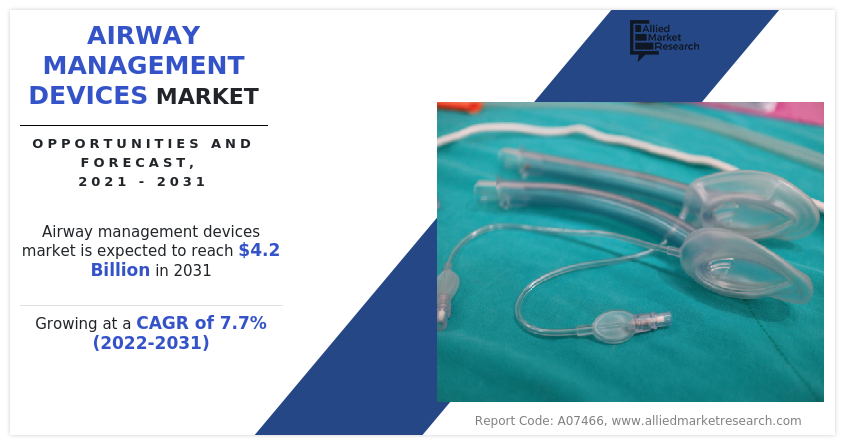
Market Dynamics
The prevalence of respiratory and chronic obstructive pulmonary disease (COPD) are the main factors driving the rise in demand for airway management devices. The World Health Organization estimates that 65 million individuals worldwide suffer from mild to severe COPD. According to CDC (Centers for Disease Control and Prevention) data, over nine million people had chronic bronchitis diagnoses in 2018, making COPD the third-leading cause of mortality worldwide. The demand for cutting-edge technologies is expected to rise as a result of the increase in surgeries and anesthetic use. According to projections, long-term lung-related therapies for both children and adults, as well as the increase in demand for emergency care for chronic illnesses, will further drive the airway management devices market expansion. The significant increase in the elderly population, which is more susceptible to respiratory disorders, is also a major factor responsible for the increase in demand for airway management devices market growth.
Developing countries have low adoption rates for expensive airway management devices due to their ineffective healthcare insurance programs. For instance, the World Bank Group estimates that the average cost of healthcare in developing nations is $80 per person annually (or $0.5 trillion). Such expenses have had a negative influence on the poor's financial situation across developing countries due to the lack of support for universal health coverage.
The industry players are investing on the R&D of smart and unique strategies to sustain their growth in the airway management devices market. These strategies include product launches, mergers & acquisitions, collaborations, partnerships, and refurbishing of existing technology. In October 2020, the commercial release of HANAROSTENT Esophagus TTS self-expanding metal stents (SEMS), created by the Massachusetts Institute of Technology and offered only by Olympus in the U.S., was announced by Olympus Corporation. Furthermore, on May 13, 2022, Medtronic plc, a global leader in healthcare technology, announced that it has completed the acquisition of Intersect ENT, expanding the company's comprehensive ear, nose, and throat (ENT) portfolio with innovative products used in sinus procedures to improve post-operative outcomes and to treat nasal polyps.
The airway management device market is segmented on the basis of device type, patient age, end user, and region. By device type, the market is classified into infraglottic devices, supraglottic devices, laryngoscopes, resuscitators, and others. By patient age, the market is divided into adult patients and pediatric patients. By end user, the market is classified into hospitals, ambulatory care, home care, and others. By region, the airway management devices market is analyzed across North America, Europe, Asia-Pacific, and LAMEA.
Segments Overview
The airway management devices market is segmented into Device Type, Patient Age and End User.
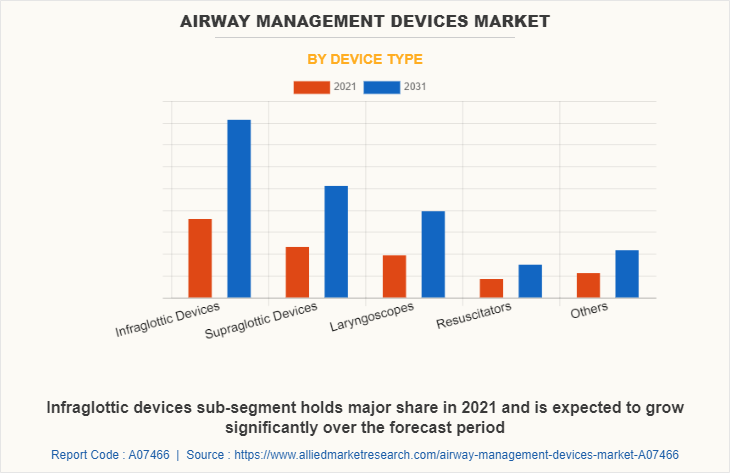
By Device Type
By device type, the infraglottic devices sub-segment dominated the airway management device market in 2021 and is expected to be the fastest growing during the forecast period. Infraglottic devices create a passageway for the mouth to flow through the glottis and then into the trachea. Numerous infraglottic techniques are available and the method chosen will depend on the accessibility of equipment, the level of training and expertise, and the patient's specific injury or disease. A few aspects such as the surgeon's experience, and the accessibility of medical equipment are taken into consideration while choosing a procedure for the patients. These are predicted to be the major factors affecting the airway management device market size during the forecast period.
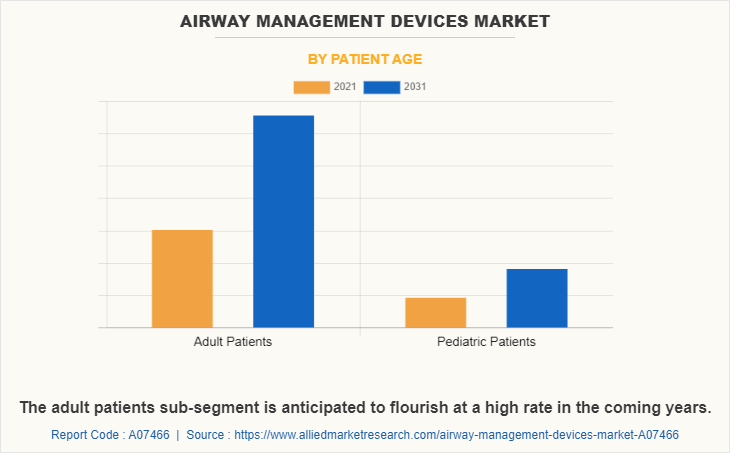
By Patient Age
By patient age, the adult patients sub-segment dominated the global airway management device market share in 2021. Adult patients the majority of visit hospitals for medical procedures when ventilation and oxygenation are needed. According to the Centers for Disease Control (CDC) and Prevention, the number of chronic disease visits to emergency rooms in the U.S. will be due to COPD, congestive heart failure, and hypertension. The increase in the adult population and the rising occurrence of chronic diseases in geriatric patients are the key factors contributing to the adult patients sub-segment growth. These are predicted to be the major factors affecting the airway management devices market size during the forecast period.
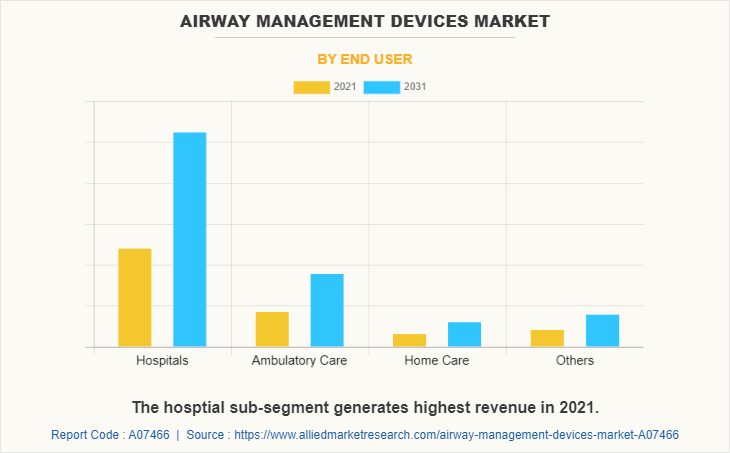
By End User
By end user, the hospitals sub-segment dominated the global airway management devices market share in 2021. The increase in the number of hospitals and the development of the economy and infrastructure, particularly in emerging countries, is accountable for the enormous share of the market. A major development in the hospital sector is further supported by the increase in surgical procedures, which rely on airway management devices market opportunity for breathing, oxygenation, and anesthetic administration. In addition, the increase in government activities targeted at enhancing safety and minimizing unfavorable incidents plays a major role in the segment's significant share.
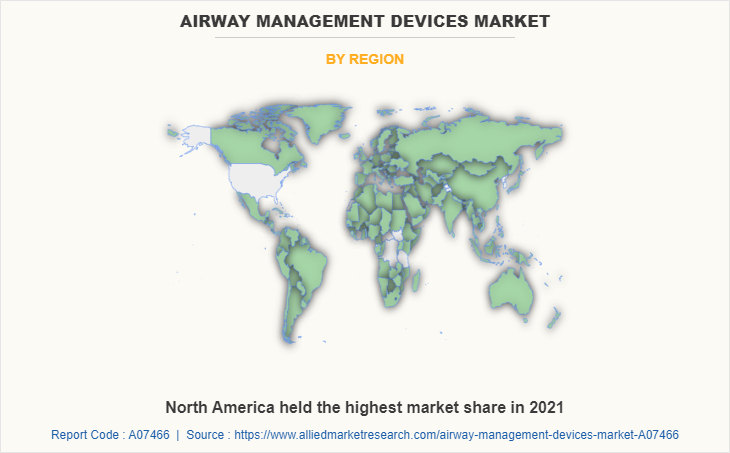
By Region
By region, North America dominated the global airway management device market in 2021 and is projected to remain the fastest growing region during the forecast period, due to the prevalence of asthma and chronic obstructive pulmonary disease, as well as the increase in the elderly population. The U.S. Census Bureau reports that as of 2017, more than 50 million Americans aged 65 and older were at the highest risk of developing chronic conditions. In North America, two important countries where such airway management devices have been widely adopted are the U.S. and Canada. The main causes of the rising need for airway management devices market forecast in North America are the rise in pollution rate and the increase in occurrences of respiratory problems, even in neo-natal care. Increase in healthcare R&D spending, and the rising incidence of chronic diseases such as COPD, the U.S. market will experience considerable expansion during the forecast period due to favorable reimbursement policies.
The key players profiled in the report include Medtronic, Smiths Medical, Inc., Teleflex Incorporated., KARL STORZ SE & Co. KG, Ambu A/S., Flexicare (Group) Limited, Intersurgical Ltd, SunMed, VYAIRE MEDICAL, INC., and Vbm Medizintechnik.
Impact of COVID-19 on the Global Airway Management Devices Industry
- The COVID-19 pandemic has positively impacted various industries such as medicine, which has led to a drastic increase in medical sales. As airway management devices are widely used to alleviate upper airway obstruction caused by tonsillar or adenoidal hypertrophy, or normal pharyngeal tissue obstruction, as often occurs in small infants, there was a significant rise in the airway management device demand globally.
- The COVID-19 pandemic has caused an increase in the number of patients being admitted to ICUs and emergency rooms. Patients with severe infections frequently need ventilators and other positive air pressure devices to treat respiratory failure or low oxygen saturation. Therefore, there is a higher need for airway management devices, particularly single-use ones.
- The number of patients who require intubation using invasive airway management techniques has increased due to the possibility of virus particles being aerosolized during non-invasive procedures. The airway management devices market for single-use devices has grown owing to the high risk faced by healthcare professionals providing airway management treatment to COVID-19 patients and other patients throughout healthcare institutions.
- However, due to the unavailability of beds and the necessity to prevent the spread of COVID-19, the overall number of surgical procedures has decreased. In addition, governments have imposed restrictions and outright bans on medical procedures and elective surgery.
Key Benefits for Stakeholders
- This report provides a quantitative analysis of the market segments, current trends, estimations, and dynamics of the airway management devices market analysis from 2021 to 2031 to identify the prevailing airway management devices market opportunities.
- The market research is offered along with information related to key drivers, restraints, and opportunities.
- Porter's five forces analysis highlights the potency of buyers and suppliers to enable stakeholders make profit-oriented business decisions and strengthen their supplier-buyer network.
- In-depth analysis of the airway management devices market segmentation assists to determine the prevailing market opportunities.
- Major countries in each region are mapped according to their revenue contribution to the global market.
- Market player positioning facilitates benchmarking and provides a clear understanding of the present position of the airway management devices market players.
- The report includes the analysis of the regional as well as global airway management devices market trends, key players, market segments, application areas, and market growth strategies.
Airway Management Devices Market Report Highlights
| Aspects | Details |
| Market Size By 2031 | USD 4.2 billion |
| Growth Rate | CAGR of 7.7% |
| Forecast period | 2021 - 2031 |
| Report Pages | 300 |
| By Device Type |
|
| By Patient Age |
|
| By End User |
|
| By Region |
|
| Key Market Players | Medtronic plc, Smiths Medical, Inc., SunMed LLC, Flexicare, KARL STORZ, Vyaire Medical, Ambu A/S, Intersurgical Ltd., Teleflex Incorporated, Convatec Group |
Analyst Review
The increase in demand for emergency and intensive care is the key factor that is projected to drive the growth of the global airway management devices market during the forecast period. In addition, airway difficulties in patients with infectious, long-term, or cardiac disorders need immediate medical attention. Similarly, those who have suffered trauma from a vehicle accident or other trauma may need airway management devices for their safety. The prevalence of these situations is driving up demand for airway management devices across the globe, which is expected to drive the growth of the market during the forecast period. However, the economic barriers are limiting access to better health treatments, which is a growth-restricting factor for the market. Furthermore, in order to comply with infection-control rules, healthcare facilities used single-use airway management devices more frequently as a result of the COVID-19 pandemic. Single-use endotracheal or tracheostomy tubes were used to intubate COVID-19 patients who needed ventilation. Global demand for airway management devices has increased due to the increase in the incidence of COVID-19. The major market players are projected to have substainital growth opportunities in the future.
Among the analyzed regions, North America is expected to account for the highest revenue in the market by 2031, followed by Asia-Pacific, Europe, and LAMEA. The North America market share is being boosted by an increase in the senior population as well as the availability of the most advanced versions of a product or service in airway equipment. These are the key factors responsible for the leading position of North America and Asia-Pacific in the global airway management device market.
One of the key factors driving the market is the increase in prevalence of respiratory diseases. In addition, the market for airway management devices benefits from the increase in healthcare spending, improvements in the healthcare infrastructure, and a strong demand for extended care delivery which is estimated to generate excellent opportunities in the airway management devices market.
Increase in application of airway management in the production of infraglottic devices, supraglottic devices, and laryngoscopes is anticipated to boost the airway management devices market in the upcoming years.
Asia-Pacific will provide more business opportunities for the global airway management devices market in the future.
Medtronic, Smiths Medical, Inc., Teleflex Incorporated., KARL STORZ SE & Co. KG, Ambu A/S., Flexicare (Group) Limited, Intersurgical Ltd, SunMed, VYAIRE MEDICAL, INC., and Vbm Medizintechnik are the major players in the airway management devices market.
Hospitals sub-segment of the end user acquired the maximum share of the global airway management devices market in 2021.
Healthcare industry are the major customers in the global airway management devices market.
The report provides an extensive qualitative and quantitative analysis of the current trends and future estimations of the global airway management devices market from 2021 to 2031 to determine the prevailing opportunities.
The major growth strategies adopted by the airway management devices market players are investment and agreement.
Loading Table Of Content...
Loading Research Methodology...



